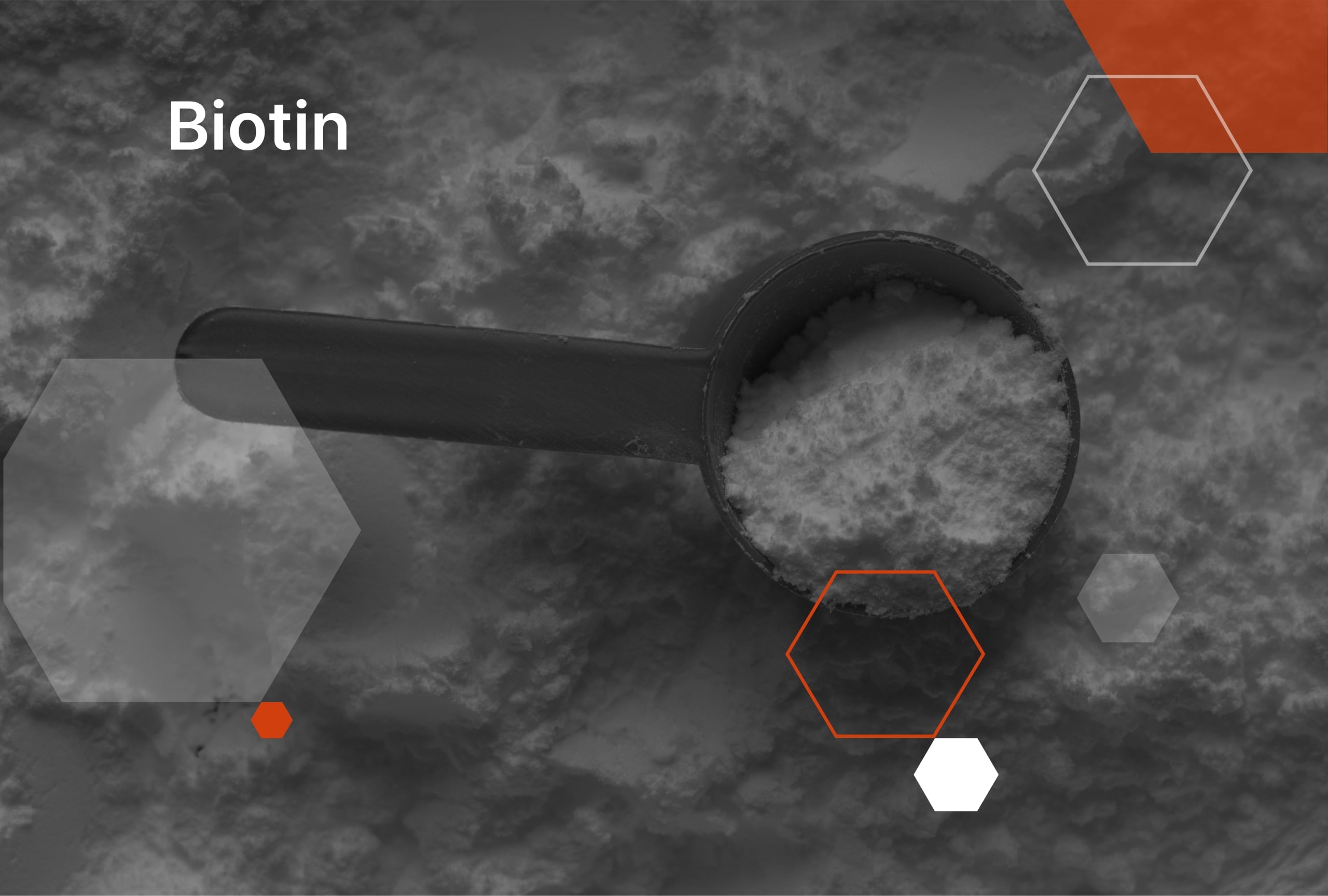
What is Biotin used for?
Kemiex is an all-in-one market information, purchasing and sales platform for animal and human nutrition raw materials. In the following series of articles, we will explain the functions and uses of products that can be found in the Kemiex marketplace. On this occasion, we are going to explain the benefits of Biotin or Vitamin H:
What is Biotin used for?
Biotin, is a B-complex vitamin that plays a crucial role in various metabolic processes in the body, being involved in the metabolism of fats, carbohydrates, and amino acids, and also helping to maintain healthy skin and hair. Additionally, Biotin plays a role in the production of hormones and helps regulate gene expression. It is essential for overall health, but the body does not produce it on its own, so it must be obtained through the diet or through supplements.
What are the main benefits of Biotin?
Biotin, also known as Vitamin H, is an important nutrient that provides several health benefits to animals. Some of the main benefits of Biotin include:
1. Healthy skin and coat:
Biotin is essential for skin and coat health, promoting the growth and maintenance of healthy hair, skin, and nails.
2. Metabolism support:
It also helps to regulate the metabolism of carbohydrates, fats, and amino acids.
3. Nervous system support:
Biotin is important for the health of the nervous system, and helps to support healthy nerve function.
4. Stabilizes blood sugar levels:
This vitamin plays a role in glucose metabolism, helping to regulate blood sugar levels and reduce the risk of diabetes.
5. Supports joint health:
Biotin is known to help support joint health, reducing the risk of joint problems and supporting the overall health and mobility of animals.
Which foods are the main sources of Biotin?
Biotin, is a B-vitamin that can be found in many food sources. Here are 10 foods that are rich in Biotin and their approximate Biotin content:
1. Liver: A 100g serving of liver provides about 30-35 mcg of Biotin.
2. Eggs: One large egg contains about 25-30 micrograms (mcg) of Biotin.
3. Avocado: One medium avocado provides about 5-7 mcg of Biotin.
4. Salmon: A 100g serving of salmon contains about 4-5 mcg of Biotin.
5. Almonds: A 100g serving of almonds contains about 4-5 mcg of Biotin.
6. Peanuts: A 100g serving of peanuts contains about 2-3 mcg of Biotin.
7. Cheese: A 100g serving of cheese contains about 2-3 mcg of Biotin.
8. Sweet potato: One medium sweet potato contains about 2-3 mcg of Biotin.
9. Carrots: A 100g serving of carrots contains about 1-2 mcg of Biotin.
10. Cauliflower: A 100g serving of cauliflower contains about 1-2 mcg of Biotin.
It is important to note that the Biotin content in food can vary depending on the specific food and its preparation method. These values are approximate and can serve as a general guideline.
Recommended daily intake (RDI) of Biotin
The recommended daily intake (RDI) of Biotin, varies based on age and gender. According to the National Institutes of Health (NIH), the following are the RDIs for Biotin:
-
Infants 0-6 months: 5 micrograms (mcg).
-
Infants 7-12 months: 6 mcg.
-
Children 1-3 years: 8 mcg.
-
Children 4-8 years: 12 mcg.
-
Children 9-13 years: 20 mcg.
-
Teenagers 14-18 years: 25 mcg.
-
Adults 19 years and older: 30 mcg.
-
Pregnant women: 30 mcg.
-
Breastfeeding women: 35 mcg.
It’s important to note that these values are the recommended minimum amounts, and individuals may require more or less Biotin depending on various factors such as overall health, diet, and lifestyle. It is also important to consult with a healthcare provider for personalized recommendations.
What are the main benefits of Biotin for animals?
Biotin, plays an important role in maintaining healthy skin, coat, and hooves in animals, as well as supporting the metabolism of fats, proteins, and carbohydrates. It is necessary for the normal functioning of various enzymes involved in energy production, and a deficiency can lead to health problems such as skin irritation, hoof problems, and poor growth. Some of the main benefits of this vitamin for animals include:
1. Promoting skin and coat health: Biotin is essential for the maintenance of healthy skin and a shiny coat, as it helps to prevent hair loss and dry skin.
2. Supporting hoof health: Biotin is crucial for the maintenance of strong and healthy hooves, as it helps to prevent hoof cracking and fragility.
3. Improving growth: Biotin is important for normal growth and development, as it plays a role in the metabolism of proteins, fats, and carbohydrates.
4. Enhancing immune function: Biotin helps to support the immune system, as it is involved in the production of white blood cells.
5. Regulating blood sugar levels: Biotin has been shown to regulate blood sugar levels, which is important for animals with diabetes.
In conclusion, Biotin is a critical nutrient for animal health, and it is important to ensure that animals receive adequate amounts in their diets through a combination of Biotin supplements and Biotin-rich foods.
Where to buy bulk Biotin and get market information?
In Kemiex, we offer a safe and private online environment to buy and sell raw materials for the Feed, Food, Veterinary, and other life science industries. We also offer market information such as Price Trends, Trade Flows and Market News for all the micro-ingredients of the mentioned industries.